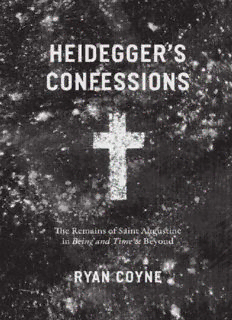
Heidegger's confessions : the remains of Saint Augustine in being and time and beyond PDF
Preview Heidegger's confessions : the remains of Saint Augustine in being and time and beyond
Heidegger’s Confessions RELIGION AND POSTMODERNISM A series edited by Thomas A. Carlson RECENT BOOKS IN THE SERIES Arts of Wonder: Enchanting Secularity— Walter De Maria, Diller + Scofi dio, James Turrell, Andy Goldsworthy, by Jeffrey L. Kosky (2012) God without Being: Hors- Texte, Second Edition, by Jean- Luc Marion (2012) Secularism in Antebellum America, by John Lardas Modern (2011) The Figural Jew: Politics and Identity in Postwar French Thought, by Sarah Hammerschlag (2010) The Indiscrete Image: Infi nitude and Creation of the Human, by Thomas A. Carlson (2008) Heidegger’s Confessions The Remains of Saint Augustine in Being and Time and Beyond Ryan Coyne The University of Chicago Press chicago and london ryan coyne is assistant professor of the philosophy of religions and theology at the University of Chicago Divinity School. The University of Chicago Press, Chicago 60637 The University of Chicago Press, Ltd., London © 2015 by The University of Chicago All rights reserved. Published 2015. Printed in the United States of America 24 23 22 21 20 19 18 17 16 15 1 2 3 4 5 isbn- 13: 978- 0- 226- 20930-2 (cloth) isbn- 13: 978- 0- 226- 20944-9 (e-b ook) doi: 10.7208/chicago/9780226209449.001.0001 Library of Congress Cataloging- in-P ublication Data Coyne, Ryan, author. Heidegger’s confessions : the remains of Saint Augustine in Being and Time and beyond / Ryan Coyne. pages cm — (Religion and postmodernism) Includes bibliographical references and index. isbn 978-0 - 226- 20930-2 (cloth : alkaline paper) — isbn 0- 226- 20930- x (cloth : alkaline paper) — isbn 978- 0- 226- 20944-9 (e-b ook) — isbn 0- 226- 20944- x (e-b ook) 1. Heidegger, Martin, 1889– 1976. 2. Augustine, Saint, Bishop of Hippo. 3. Philosophy and religion. I. Title. II. Series: Religion and postmodernism. b3279.h49c696 2015 193—d c23 2014031387 This paper meets the requirements of ansi/niso z39.48- 1992 (Permanence of Paper). For Sarah and Lila Contents Acknowledgments ix Introduction 1 1. Heidegger’s Paul 17 2. The Cogito Out- of- Reach 53 3. The Remains of Christian Theology 87 4. Testimony and the Irretrievable in Being and Time 124 5. Temporality and Transformation, or Augustine through the Turn 157 6. On Retraction 194 Conclusion: Difference and De- Theologization 229 Notes 243 Selected Bibliography 279 Index 297 vii Acknowledgments “What do you have that you have not received?” Augustine often quoted 1 Corinthians 4:7 as a reminder that while his faults were his own, what he accomplished he owed to the grace of others. Writing this book I have felt similarly about those who have sustained me along the way. A fateful conversation with Jean- Luc Marion, on the corner of Dorches- ter and 59th Street in Chicago’s Hyde Park, gave rise to this project. From that moment he has affirmed its development in countless ways. David Tracy’s incomparable wisdom and openness continue to inspire me. He teaches by word and deed. For the better part of a decade, in two different institutional settings, I had the honor to study with Amy Hollywood, an exemplary scholar and a tireless champion of her students. I count myself lucky to call her a mentor and a friend. Without the encouragement of my colleagues at the University of Chicago I could not have completed this project. I am grateful to Arnold Davidson for his guidance and generosity in reading this manuscript. My fascination with modern German philosophy I owe in part to Françoise Meltzer, whose lectures gave me a new perspective on Kant. Special thanks are due as well to Richard Rosengarten, for his faith in this project and for his support at every step along the way; Margaret Mitchell, for steadying me at key moments; and Paul Mendes-F lohr for his encouragement. It is a privilege to work at Swift Hall alongside so many admirable individu- als. I am grateful to Dan Arnold, Jeff Stackert, and Catherine Brekus for their friendship and insight over the years. My ongoing conversations with Simeon Chavel, Franklin I. Gamwell, Clark Gilpin, Kevin Hector, Wil- lemien Otten, Jim Robinson, Susan Schreiner, and Christian Wedemeyer have invigorated me. Over the years I have profi ted greatly from the men- ix
Description: